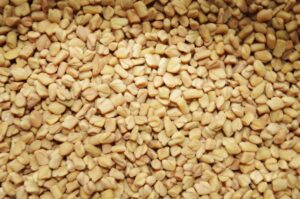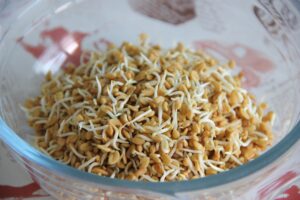Methi for diabetes works like a wonder drug that balances the health condition when consumed in the right proportion. The aromatic ingredient is widely grown across South Asia and North Africa and comes with the goodness of medicinal properties.
More than 77 million people in India have diabetes. Preventing the condition is of utmost importance if you are genetically prone to become diabetic or have underlying health conditions.
Do you want to have a diet plan because you are prediabetic or diabetic? You can reach out to HLTH today for professional guidance and assistance.
Before exploring all the nutritional requirements, we can customize for you, let us quickly find out why we recommend the usage of fenugreek.
Case Study
National Center for Biotechnology Information (NCBI) presented results from a study that proves the efficacy of methi for diabetes. The results demonstrated that methi could potentially prevent diabetes mellitus if you are prediabetic.
A group of prediabetic men and women aged 30-70 participated in the study. They consumed 5 grams of methi once before lunch and once before dinner for three months straight.
At the end of the intervention, the probability of developing type 2 diabetes drastically dropped. Tests proved reduced fasting plasma glucose levels, low-density lipoprotein cholesterol, and postprandial plasma glucose. Moreover, the serum insulin level improved.
As recommended by NCBI, including 10 grams of methi in the diet of a prediabetic individual can increase insulin resistance.

How does methi for diabetes control work?
Using methi powder for diabetes helps you incorporate a highly soluble fibre that reduces blood sugar levels. Methi slows digestion and helps absorb carbohydrates. It is hypoglycemic and lowers the glycemic index of your overall diet.
Methi nutritional value
With a calorie count of 333 from every 100 grams of methi, this ingredient is rich in vitamins, minerals, and carbohydrates.
It also has phytochemicals like flavonoids, alkaloids, galactomannan, steroids, hydrocarbons, and phenolic acids.
Nutritional value of methi
- 26.2 g of protein
- 44.1 g of carbs
- 48.6 g of fibre
- 5.8 g of fat
- 160 mg of calcium
- 6.5 mg of iron
- 0.71 mg of copper
- 190 mg of magnesium
- 370 mg of phosphorous
- 19 mg of sodium
- 530 mg of potassium
How to use methi for diabetes
Here is a video to help you use methi for diabetes patients:
Steps to use soaked methi seeds for diabetes
Steps 1
Measure 10 grams of methi seeds with the help of a food measuring scale
Step 2
Add it to a glass of water and let it soak overnight
Step 3
Drink the water as the first thing you consume the next day
Step 4
The hard seeds soften due to the water and making it easy for you to chew
Follow this remedy for 60 days to see visible results.
Different ways to add methi to diet
While we have already shared the most effective way to incorporate methi for diabetes, check out some other ways to consume it:
Methi paratha for diabetes
Parathas are an Indian staple. No matter how much we diet, we can’t say no to a wholesome meal full of delicious parathas and achar.
Using methi leaves for diabetes can help you make a healthier choice when eating paratha for breakfast. Replace maida with atta to choose a better alternative, and add methi as a stuffing.
Methi ladoo for diabetes
Ladoos comes with a lot of sugar, so it is best to replace it with jaggery. While the calorie count will be similar, you will add nutrients to your body. Methi ladoo recipes will reduce sugar absorption, making it a healthy choice when making treats like ladoos.
Mixing in with dal
Aren’t mixed dal recipes simply delicious? When cooking it the next time, add fenugreek as an additional ingredient. It will amplify the taste and give you all the nutritional benefits.
Methi as sprouts
While this is an unfamiliar option, methi sprouts are another effective way to add raw seeds to your diet. Sprouted fenugreek seeds are easier to digest. You can have it at supper when your hunger pangs make you crave unhealthy junk food.
Make a tasty chat with sprouted chana, cucumber, tomatoes, and onions, alongside the magical fenugreek seeds. A dash of lemon is all you need before you dig in.

Benefits of fenugreek
Fenugreek is a potent nutrient that offers plenty of benefits alongside preventing diabetes. Let us find out the top reason to consume methi:
Hair health
Hair issues like dandruff, dry hair, and hair fall are common problems that spare no one. There are times when we wish to ditch chemical-based products and want to shift to healthier alternatives.
Homemade methi recipes for hair can improve hair health. Fenugreek includes proteins and nicotinic acid that strengthens the roots of our hair.
Consuming fenugreek seeds can show a significant change in hair health within two months. So, if you are following the remedy we have shared, you are likely to see changes in your hair health.
Weight loss
Multiple types of research have proved that adding fenugreek to the diet can reduce weight. A study conducted on four groups of mice showed a decrease in body weight after regular fenugreek ingestion for three weeks.
Another study included people who consumed fenugreek tea for a significant period to find lowered appetite. Fenugreek has high fibre content that makes our body feel full for a long time. If you consume it before meals, it reduces your appetite and makes you consume fewer calories.
Reduces menstrual cramps
In 2014, a study was conducted and presented in the Journal of Reproduction & Fertility. It involved 101 women who consumed 900 mg of methi powder on the first three days of their menstrual cycle. The results suggested that they felt less pain and cramps compared to another group who were on a placebo.
Extreme menstruation pain can lead to fainting tendencies. But, as per the study, the group that consumed less methi had reduced chances of fainting, headache, fatigue, vomiting, and nausea.
Improves breast milk
According to an age-old Indian ghar k nuske (home remedy), methi stimulates breast milk production. The ingredient’s potency improves estrogen levels and aids a lactating mother in offering more nutrition to her newborn.
A study was done by the Journal of Complementary and Alternative Medicine in 2011. There were two groups involved in the study. The groups included nursing mothers; one group consumed fenugreek tea while the other consumed placebo tea.
It is also important to note, the group that consumed fenugreek tea had babies that gained weight before the infants of the other group. The total number of participants in the study was only 66, so more research is required to testify further.
Lowers cholesterol
Methi seeds can help you reduce bad cholesterol levels (LDL). The rich components of steroidal saponins absorb bad cholesterol and triglycerides. It keeps the liver healthy if consumed in the right proportion.
Fenugreek diabetes side effects
According to the Food and Drug Administration (FDA), fenugreek is safe for consumption. However, there are some aspects to beware of because there are possibilities of dizziness, diarrhoea, and gastric issues. These are common if consumed excessively.
Here are some of the methi side effects to look out for:
Appetite change
Fenugreek slows down metabolism and makes you feel less hungry. While this is the same reason that aids weight loss, it can disrupt your current appetite. If you are underweight, you should avoid consuming methi seeds.
Low blood sugar
Everything in moderation is the key to a healthy life. Consuming high doses of fenugreek seeds can drop low sugar levels drastically.
If you already consume diabetes medications, they can react adversely. In this case, it is best to consult your doctor before adding 10 g of fenugreek seeds daily.
Lowers potassium level
You must avoid methi completely if you take medicines that reduce blood potassium, like diuretics.
Allergy
People who have allergic reactions to peanuts, coriander, and chickpeas, might also have the same from fenugreek seeds.
Liver conditions
Although rare, liver toxicity is possible from excessive fenugreek consumption.
Pregnancy issues
While fenugreek might be good for lactating mothers, it is unsafe to consume during pregnancy. Until your doctor recommends including methi in your diet, you should avoid it.

Get expert assistance today
Do you want to find out if ingredients like kalonji and methi for diabetes work for you? Do you want to transform and become a healthier and stronger version of yourself?
You are one DM away from getting expert assistance. At Half Life To Health, we are relentlessly working towards helping women become fit daily.
If you are diabetic or prediabetic, we will help you manage your health condition by providing the direction you need. We will thoroughly review your medical history to customize a diet plan according to your nutritional requirements.
Let us join hands, create a vision, and work on it together to become healthier, happier, and stronger!

